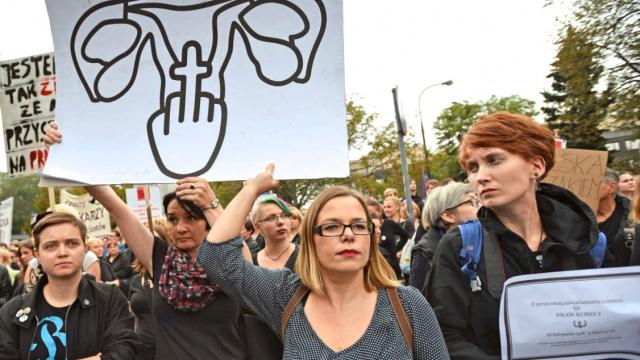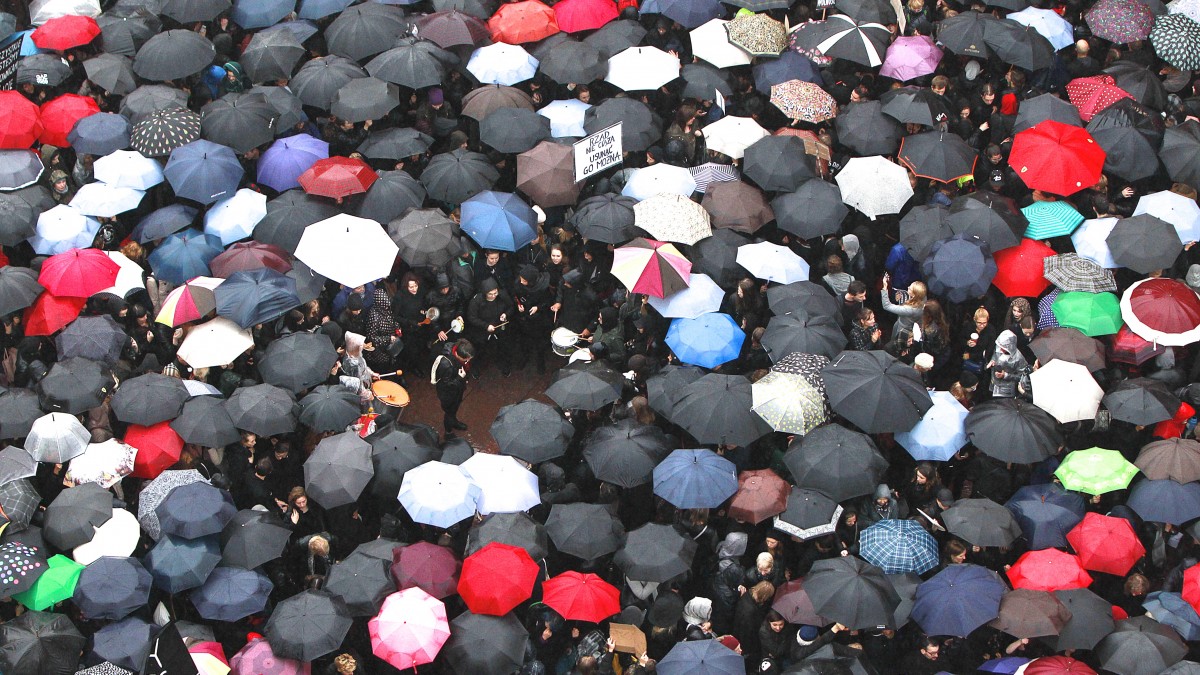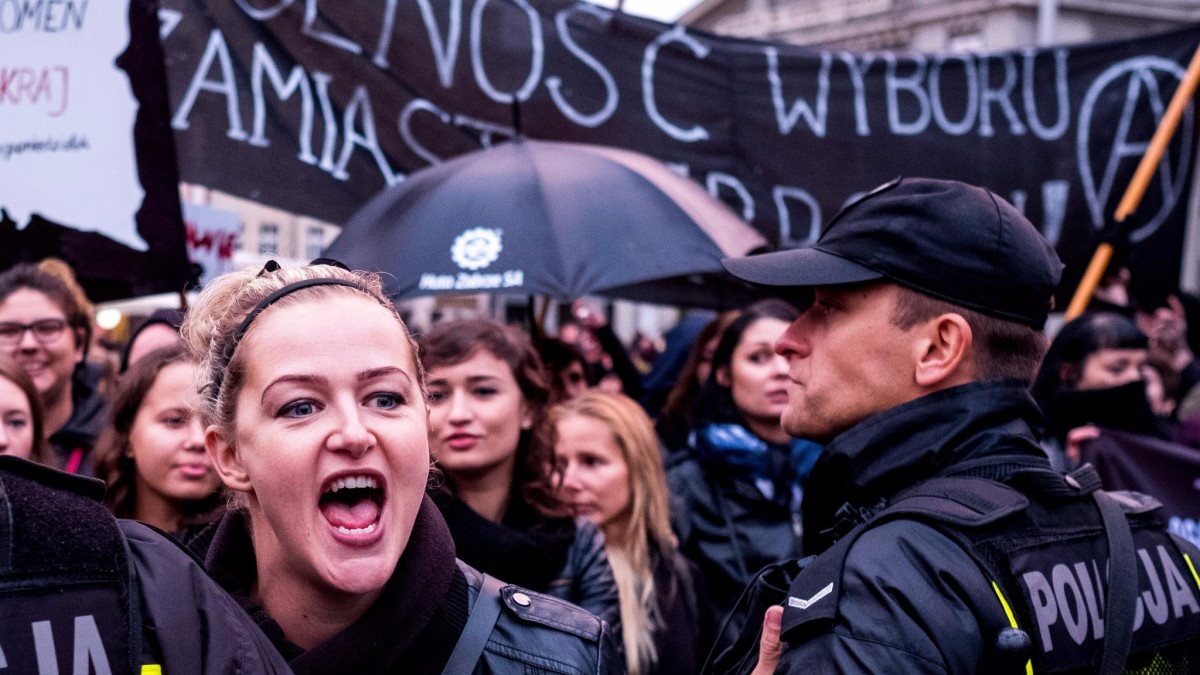
For most people, this month's Polish Black Protests evoke imagery reminiscent of the second feminist movement: Tens of thousands of citizens, united against the proposed legislature of a conservative administration, determined to stand up for women's reproductive rights. Dressed all in black, the protesters first gathered in Warsaw's Castle Square on October 3 carrying placards and chanting, in one voice: "We want doctors, not missionaries!"
Across the country that day, the protestors participated in blood drives and book readings to spread the word for their cause, while women either skipped work in protest or showed up dressed in black. Many businesses closed in a show of solidarity, and government buildings were forced to shut down across 60 cities. More importantly, the protesters maintained a strong social media presence throughout.
The proposed legislation promised to outright ban abortion in the country, even in cases of pregnancy resulting from sexual abuse, threatening women and doctors performing the operation with up to five years' imprisonment. The law would have made abortions in the country fully prohibitive, like in Malta and the Vatican, two of Europe's overwhelmingly Catholic states. It's important to note, however, that thousands of illegal – and risky – abortions are already taking place within the country on a yearly basis, and Polish women are routinely forced to travel to nearby Germany or Hungary in order to visit qualified physicians.
The People's Will
While the proposed legislation came as a shock to the international community, Polish citizens were perfectly aware of it. In fact, the abortion ban was on the political agenda of the country's current governing Law and Justice Party, or PiS. The Prawo i SprawiedliwoϾ Party is a far right, outspokenly pro-religious, anti-immigrant, Euroskeptic party that spoke to the nationalistic and highly religious Polish population occupying poorer parts of the country, promising them a strong state sheltered from the uncertainty of social and economic liberalism. The party's message coincided with the rising trend in many West European countries that sees the European Union as a largely indifferent institution, which has drafted wildly unpopular economic policies without considering citizens' own needs.
In one fell swoop, Poland's governing party promised to restore the country's sexual morality by banning abortion and in vitro fertilization, providing hefty welfare support to disenfranchised citizens, and punishing its corrupt banks and supermarket chains to boot.
To PiS's credit, Jaroslaw Kaczynski, the party's leader, organized a very effective campaign by promoting female candidate Beata Sjydlo for prime minister, and by maintaining a modern promotional approach through widespread social media presence. While PiS did not speak to an overwhelming majority in the country, its message resonated across the population, with voters helping it secure the administration in last year's election. The party's success was compounded by the lack of any solid opposition in Parliament, as Poland still seems to be struggling with the concept of a united political front, an unfortunate remnant of its Soviet past.
Within a few months after assuming power, PiS began a steady campaign of stifling media coverage, with members of the party openly admitting that they were considering "re-Polonizing" certain foreign-backed elements in the country's major media outlets. Ryszard Terlecki, head of PiS's parliamentary caucus, was quoted saying: "If the media imagine they will occupy Poles by criticizing our changes, then this has to be stopped."
Soviet Reproductive Rights: A Historical Detour
The history of Polish abortion has been long and winding. Poland was the first European country to legalize abortions in 1932, provided that the pregnancy was a result of sexual abuse (such as rape or incest). After the end of the Second World War and Poland's annexation in the Soviet Union, the law became increasingly harder to enforce and gradually evolved into the abortion legislation of April 1956, which stated: "...an abortion is allowed in order to protect the health of the woman against the ill effects of abortion done in bad conditions and not by a doctor."
More importantly, the law went on to specify the exact conditions under which a woman could resort to a state-mandated abortion, claiming it was only possible when "medical indications favor it" and there were proven "difficult conditions of life for the pregnant woman." This required a state-appointed witness, whose opinion was highly subjective and largely fallible, to observe the pregnant woman until they were convinced of her own wretchedness. The obviously restrictive clauses of the law later forced the Soviet government to amend it in 1961, waving the article that required a woman to provide proof of her harsh living conditions.
When the Soviet Union collapsed and the new democratic status quo was established in 1993, Poland's current strict anti-abortion legislation was adopted. The law was pushed mostly by right-wing political representatives, citing Poland's previous stance toward abortion as remnant of its inglorious Communist past.
National Debate, International Implications
The current Polish abortion debate is not an exclusively national affair. If anything, the language, symbols and approach used by either side seem to be distinctly American. Mariusz Dzierzawski, one of Poland's major anti-abortion activists, openly admitted that his entire campaign was based on tactics employed by Gregg Cunningham, the founder of the Center for Bio-Ethical Reform, who visited Poland in 2004 and has maintained regular contact with Dzierzawski since.
At the same time, the pro-abortion side also employs international symbols, widely applying the "coat hanger" to symbolize the dangerous alternatives that Polish women will be forced to resort to should the legislation pass, and by employing such slogans as "My Body, My Business!"
The sheer scale of the protests and their international repercussions this month finally forced the governing party to back down from initiating its proposal. According to Jarosław Gowin, Poland's Minister of Science and Higher Education, the protests “caused us to think and taught us humility.”
An important aspect of the aftermath, however, is the Polish government's stance toward resolving the issue on a national level. Responding to the highly emotional outburst in the European Parliament over the issue, Jadwiga Wisniewska, PiS's EP member, said, “You are talking about something on which you don’t have the right to legislate.”
The administration announced it would withdraw its support for the initial proposed legislation, as submitted by the Catholic citizen group Ordo Iuris, and proceeded to draft a new law that would instead outlaw "eugenic abortions" – that is, abortions on the grounds of congenital disorder or fetal deformity. According to Jaroslaw Kaczynski, the revised law would "...strive to make cases of even very difficult pregnancies, when the child is doomed to die (because it is) severely deformed, finish with birth, so that the child can be baptized, buried, given a name."
This development caused the Black Protesters to rally again on Sunday, Oct. 23, and into Monday, with organized marches taking place in 50 cities across Poland. While Jaroslaw Kaczynski spoke against penalizing women for having abortions and offered financial support as an alternative, Polish women still worry that the legislation will create a very dangerous precedent for their reproductive rights. Poland is, after all, an openly religious country with strong ties to Catholic dogma; over 80% of its population is observant.
Regardless of the proposal's outcome, the Black protests have served to make one thing particularly clear: Peaceful, organized protests coupled with a powerful social media presence can help make any cause known to the world. And with the international backlash that the issue has already provoked, many see an interesting precedent for Polish policy making.
3 WAYS TO SHOW YOUR SUPPORT
- Log in to post comments













